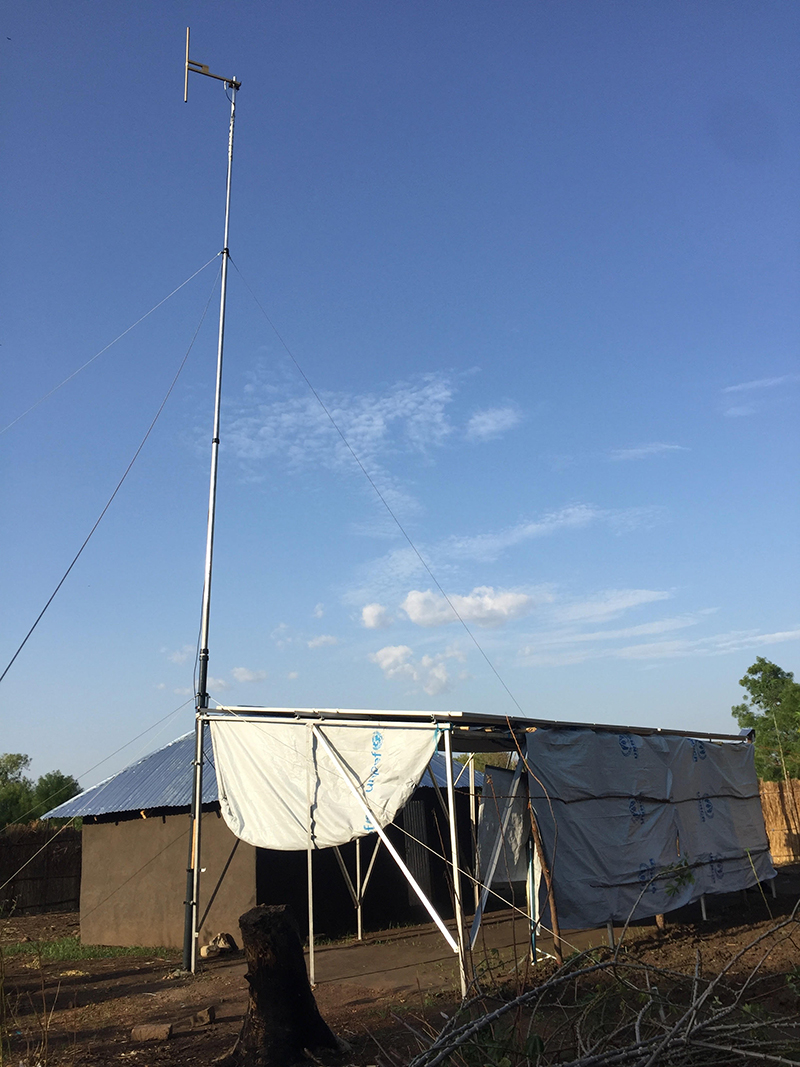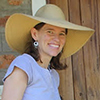“Will you come and see it?” asked a young man. I had met him three years prior at a peacebuilding training. Pochalla’s first-ever FM radio station opened a week or two before I arrived. So, I followed him down the dirt paths, weaving around homes with grass thatched roofs.
To get to Pochalla, I flew for an hour and a half over a vast, uninhabited land spotted only by trees. I have visited just a few other communities in South Sudan as isolated as this one. In such locations, I talk to God more than I do in towns or cities. In part because the picturesque landscape combined with the warm hospitality of residents renders a spirit of thankfulness; in part because I am afraid of wounding people with my words, so I pray for wisdom for the many times I will be asked to speak.
“It is nice,” I affirmed, my gaze journeying from the mud-walled building with solar panels up the tall, thin pole reaching into the sky.
“Will you please talk on the radio and greet Pochalla?” inquired another young man standing in the door of the station. “Greeting” in this context, often carries an expectation of more than a brief sentence or two.

Nancy Smith-Mather speaks on the first-ever FM radio station in Pochalla, South Sudan.
“Will you come and see it?” asked a young man. I had met him three years prior at a peacebuilding training. Pochalla’s first-ever FM radio station opened a week or two before I arrived. So, I followed him down the dirt paths, weaving around homes with grass thatched roofs.
To get to Pochalla, I flew for an hour and a half over a vast, uninhabited land spotted only by trees. I have visited just a few other communities in South Sudan as isolated as this one. In such locations, I talk to God more than I do in towns or cities. In part because the picturesque landscape combined with the warm hospitality of residents renders a spirit of thankfulness; in part because I am afraid of wounding people with my words, so I pray for wisdom for the many times I will be asked to speak.
“It is nice,” I affirmed, my gaze journeying from the mud-walled building with solar panels up the tall, thin pole reaching into the sky.
“Will you please talk on the radio and greet Pochalla?” inquired another young man standing in the door of the station. “Greeting” in this context, often carries an expectation of more than a brief sentence or two.
Five mothers after the PTA meeting.
The PTA meeting brought together parents from four schools in Pochalla. They gathered together to discuss the large number of children who are not in school. First, they shared the reasons for lack of attendance:
“The reason children are not coming to school, “one mother shared, “is due to a lack of notebooks (paper) in schools, and because they are going hunting.” In my short time in Pochalla, I bumped into several young boys on the road, who proudly carried antelope meat on their shoulders.
Another father added, “When I find children around, I used to ask them, ‘why did you not go to school?’ and they respond, ‘there are no teachers in school,’” lifting up a common complaint about government schools. He then explained that the government is not paying the teachers enough for them to work regularly.
After the reasons for lack of attendance, came suggestions for “joining hands together” and getting children in school.
“We will keep making awareness,” one parent committed. Then the group agreed that in areas with high numbers of children out of school, they would call parents together for tea and talk about the benefits of education.
When asked to speak at the end of the PTA meeting, I shared some more of my mother’s wisdom. “My mother was a teacher,” I started, “and toward the end of her career, she taught in one school with low performance in test scores and then in another school with high performance. From her experience, she said that the schools which perform well are the schools in which the parents are involved. I am happy to see so many parents at this meeting. As parents, you have the power to bring about the changes you want to see …”
After the meeting, Okon accompanied me the half mile back to my accommodation. “I will not forget your family’s message,” he said, referring to my mother’s messages. I thanked him for the good work he is doing with the PTA, and we parted ways.
Before leaving Pochalla, I prayed that any of my words or actions that caused offense would be forgotten and that an attempt to share in God’s love and service together would remain. The geographic distance between our lives would limit our future encounters, and the distance in our life stories limits our points of connection, yet some of our experiences are shared: worshipping on Sundays, attending PTA meetings, wanting the best for our kids.
With a full heart, I stepped into the helicopter to depart a beautiful place that reminded me of my mother’s wisdom, of parents’ common goal of raising their children well, and of God’s grace in giving me opportunities to listen and to speak.
May God give each of us the wisdom to find what is shared and the courage to love one another, even when we are sure that at times we will fail.

Nancy Smith-Mather
Nancy Smith-Mather and her husband, Shelvis, are Reformed Church in America missionaries serving alongside the Reformed Church in America’s South Sudanese partners in both Uganda and South Sudan.



